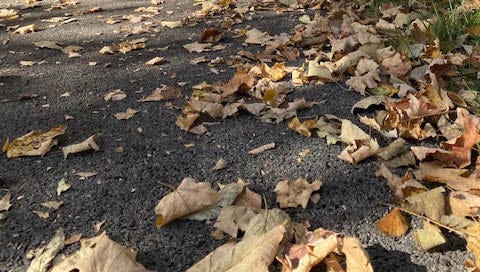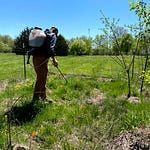This is the newsletter version of Sara by the Season, where I explore a little bit of everything that’s on my mind as I try to lean into nature’s wisdom and rhythms. You can listen to me read you the newsletter by hitting play above - or you can click the little link above and to the right to play in your favorite podcast player. If you know someone who would like this sort of thing, I’d be so grateful if you would share it!
patriarkhēs, from the Greek, πατριάρχης. Formed from the compound of patria ("lineage, descent, family, fatherland"), patēr (“father”), and arkhē ("domination, authority, sovereignty").
From patriarkhēs, we get “patriarchy,” which, etymology tells us, means to sit under the rule or authority of fathers. The root of our matriarchy is similar, except with matria- obviously meaning mother instead.
I was listening to this podcast a few weeks ago when Stephen Jenkinson, the guest, pointed out that he has never heard the word “matriarchy” used derisively, but that he hears “patriarchy” used that way all the time. It was a bit of an aside comment, but I haven’t been able to stop thinking about it. I use “the patriarchy” as a catch-all word for all sorts of systemic (and individual) ills in the world, so I’m as guilty as anyone of this practice.
As I’ve reflected on why this comment struck me so forcefully, I’ve been wondering about the following:
Patriarchy isn’t inherently bad or evil; just as matriarchy isn’t. Sitting under the authority of (good) fathering and (good) mothering is an important part of an individual’s and a culture’s growing up and maturing.
So fathering is good and needed, just as mothering is. Perhaps we need to differentiate between the ways in which patriarchy has abused and neglected its responsibilities and the ways in which patriarchy is good and beneficial. In a similar way to how we have tried to differentiate toxic masculinity from non-toxic, we could name the (many) toxic forms of patriarchy and its effects on our cultures today instead of lumping all of the toxic forms together in one category and, therefore, neglecting or ignoring the ways in which sitting under the authority of fathers can be beneficial.
Fathering and mothering aren’t determined by genetics, but are functions or roles available to all of us, no matter our gender identities. By demonizing the word “patriarchy,” have we somehow demonized fathering? And what are the downstream effects of this throwing the baby (fathering) out with the bathwater (toxic patriarchy)?
Yogis like to say “what we resist, persists.” In yin, I often use the beach ball analogy to teach this concept: the stuff we push down, numb, or in some other “offload our hurt,” is like pushing a beach ball under the water in a pool or lake. You push it down in front of you, but it pops back up somewhere else, likely at a time or place where you don’t want it to. Better to deal with it when it’s right in front of you, instead of stuffing it down or numbing it away - only for it to rear its head in ugly and unexpected ways later.
By fomenting so much resistance to The Patriarchy, have we instead just forced it underwater so that it comes up sideways, more toxic and dangerous than had we dealt with it when it was right in front of us?
This seems to explain the rise of white nationalism in so many places, the entire Trump phenomenon, as well as so much of the blowback around critical race theory, LGTBQ acceptance, and much else that you’ll see them talking about anytime you turn on cable news or see what’s trending on Twitter.
This reminded me of something I read recently from Bayo Akomolafe, a teacher who has been blowing my mind lately. He writes:
Very often systems of oppression endorse their own critique, making room for dissent, so long as this is contained within the architecture of its preferred reality. Said another way, we will often reinforce the very dynamics we are trying to defeat with our opposition.
He is saying that the system thrives on having something to resist against, so our acts of resistance backfire, by actually strengthening the system by giving it a force to react in opposition to. He seems to be saying what the yogis say: that our resistance to the toxic aspects of patriarchy keep it persisting.
I don’t know what to do with that or do about it.
But it seems important to name it nonetheless.
Raves and a rant
👍 I’ve been listening to a LOT of the Mythic Masculine podcast in the name of following my curiosity, and I have yet to find one that wasn’t worth listening to.
👍 If you haven’t already, now is the time to find fun Advent calendars. I bought this one for Jasper because he loves Haribo candy and this one for Maeve because she is weirdly obsessed with fidgets. I got a boozy one for Grant, and I’m still on the lookout for one for myself. Here is a fun list to look through.
👍 I fell off the journaling wagon for awhile, but I decided to just set a timer for 15 minutes, start off with the phrase “I wonder…”, and let my thoughts flow. Most of the time, nothing particularly insightful comes up, but it is a way of inviting my curiosity first thing in the morning that has me excited about journaling again.
👍 Mare of Easttown was so beautifully written and acted. I don’t even like crime stories generally, but this was just great art.
👍 I told my dad about three months ago in response to a text about Jasper getting vaccinated that the parents of kids under 12 “are not alright.” I’m not naïve enough to think that a simple shot will make everything better, but I can tell you that a little bit of the weight I’ve been mindlessly carrying lifted off my shoulders when I made Maeve’s Covid vaccine appointment this week.
👎 I’ve been sending out loads of book proposals for my book on living seasonally the last few weeks. The response thus far has been that my platform isn’t big enough to sell a book like mine. Rejection is never fun, but getting rejected for that reason (one you can’t much control, especially if you find the social media platforms you’re supposed to be using to build said platform problematic, to put it nicely) is a particular kind of shitty feeling.
Stuff worth sharing this week
Virginia Sole-Smith wrote about one of my sacred cows/teachers this week, and it blew my mind in the best sort of way. I’m so curious about these issues or stories that we romanticize about how things “used to be” are in fact either very privileged or just plain wrong.
It’s Native American Heritage Month. Celebrate by picking up one of these poetry collections. I’ve added a few to my Christmas wish list, so I’ll keep you posted.
Cheers to wondering about what we’re resisting in the week ahead,
Sara















Share this post